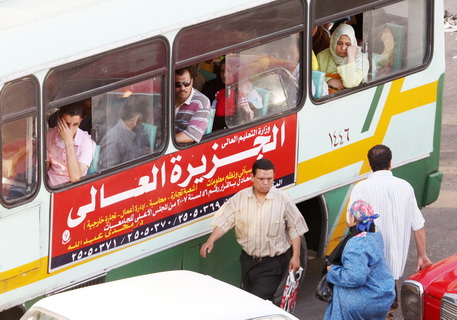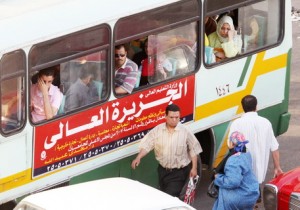In an interview with Mohamed Sadiq, head of the Shura Council’s Transportation Committee and member of the Freedom and Justice Party (FJP), he stressed that there was no need to establish a ministry for maritime transport but that re-structuring the Ministry of Transportation could ensure that the country benefits effectively from all sectors.
The demands made by the employees of the General Transportation Authority’s (GTA) to transfer the GTA from the Cairo governorate to the Ministry of Transportation are indicative of their aspiration to improve their social welfare and make them equal with their colleagues in the ministry.
He stressed the need to establish a body to manage shipping and transportation in all the governorates.
Sadiq explained that President Morsy’s Nahda project, which the Muslim Brotherhood prepared, gives priority to developing Egyptian ports and logistic capabilities, in addition to building industrial cities near every port.
The current network of roads and bridges in Egypt is not sufficient and that there is an urgent need to expand it, Sadiq noted.
Also, the plan drafted by the Japanese International Cooperation Agency (JICA) to develop the Egyptian transportation sector will meet some of the country’s needs, but not all.
Therefore, there is a dire need to switch to mass transit in order to avoid heavy congestion and traffic accident, which have been in steady increase.
Achieving a balance between the use of railways and waterways on one end, and the network of roads on the other is key to solving the unbearable transportation conditions.
Sadiq demanded that the government increases the Egyptian Railway Authority (ERA)’s 2012-2013 budget by EGP 3 billion, adding that the railways require many times the current budget to improve transportation for goods and people.
He also called on the government to increase the River Transport Authority’s budget, which was set at only EGP 260 million.
As for the budget set for the National Authority for Tunnels, which is EGP 4.5 billion, Sadiq considers it insufficient to cover current Metro projects, noting that the government must quickly complete the third and fourth Metro lines to help solve the transportation crisis.
The discussion then moved to the Suez Canal, as Sadiq condemned the lack of investment in its development.
The Suez Canal is a vital and strategic waterway, situated in the centre of the world through which a quarter of world trade flows.
Commercial traffic through the canal is expected to increase in the near future, according to Sadiq, and thus Egypt should develop the logistical capabilities of the area to include manufacturing facilities for maintenance of cars as well as ships.
Ganzouri’s budget for the 2012-2013 financial year did not include any new plans to develop the Suez Canal, it is rather views it as merely a waterway, Sadiq exclaimed.
The Transportation Committee previously stressed the need to develop the area and prepared a memorandum calling for comprehensive development of industry, logistics, housing, trade, tourism, and manufacturing.
Sadiq went on to say that developing the Sinai Peninsula is vitally linked to the development of the Suez Canal region, noting that the area has a pressing need for two more tunnels, one in Port Said and the other in Ismailia in order to speed up development.
“A significant number of deals signed during the former regime misused public resources, which the committee found out about while reviewing contracts for ports in Port Said and Damietta.”
In addition, he pointed out that the Egyptian Administrative Control Authority reported that the state incurred nearly $500 million in losses as a result of a contract signed between the Suez Canal Container Terminal and the Port Said Port Authority.
Despite such losses, the state did not annul the agreement or demand compensation from the company.
The Ministry of Transportation under Ganzouri’s government was not able to implement the decisions of the Transportation Committees in the People’s Assembly or the Shura Council, nor was it able to recover any losses incurred by the state.





